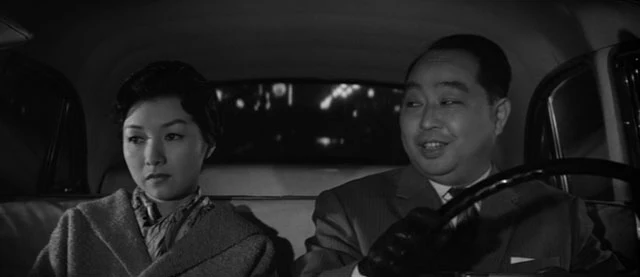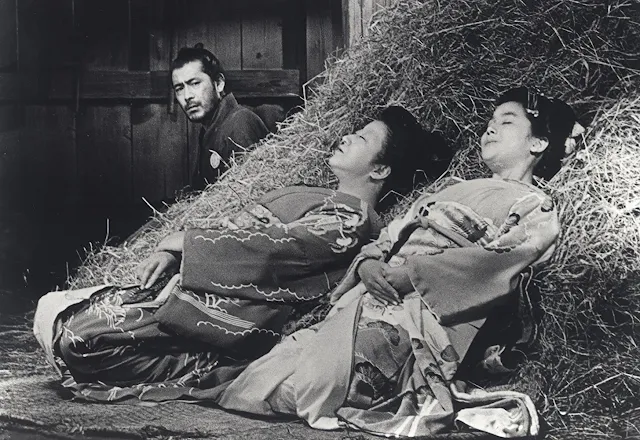 |
| Hideko Takamine and Daisuke Kato in When a Woman Ascends the Stairs |
Kenichi Komatsu: Tatsuya Nakadai
Junko Inchihashi: Reiko Dan
Nobuhiko Fujisaki: Masayuki Mori
Matsukichi Sekine: Daisuke Kato
Yuri: Keiko Awaji
Goda: Ganjiro Nakamura
Minobe: Eitaro Ozawa
Tomoko: Chieko Nakakita
Director: Mikio Naruse
Screenplay: Ryuzo Kikushima
Cinematography: Masao Tamai
Production design: Satoru Chuko
Film editing: Eiji Ooi
Music : Toshiro Mayuzumi
If I ran a revival house like the Stanford Theater in Palo Alto or the Castro in San Francisco, I'd like to program a series of double features of American and Japanese "women's pictures." It would give us a chance to compare not only directors like Douglas Sirk and Mikio Naruse but also the actresses most associated with the genre: Joan Crawford, Jane Wyman, and Lana Turner on the one hand; Kyoko Kagawa, Setsuko Hara, and Hideko Takamine on the other. Takamine is the woman who ascends the stairs in Naruse's film, only to hit something like a glass ceiling. She plays Keiko (at first a little confusingly, at least to Western audiences, called "Mama"), a Ginza bar hostess whose job it is to bring in paying customers, especially rich ones,who will while away their after-office hours flirting with her and the fleet of bar girls. She doesn't sleep with the customers -- even the younger women aren't expected to, but sometimes do -- and though she drinks with them, she doesn't particularly like alcohol. But Keiko is on the brink of turning 30, and when the bar starts losing customers to a younger hostess named Yuri, who has left Keiko's establishment to start her own, she begins to see what a dead-end she faces. She doesn't own the bar where she works, and the woman who does is beginning to blame her for losing customers and for not wearing flashier kimonos. She supports her mother and somewhat feckless brother, who has a son who needs an operation to correct a defect left by polio.She begins to hate climbing the stairs to the bar every night and the stress brings on a peptic ulcer, but she can see only three options for her life: Marry, become the mistress of a wealthy patron, or buy her own bar. Each of these opportunities presents itself during the course of the film, only to end in disappointment, and at the end she is climbing the stairs again. Takamine is marvelous, so expressive that we hardly need her voiceover narration to know what she's feeling and thinking, and she's well-supported by Reiko Dan as the younger, more carefree bar girl; Tatsuya Nakadai as the bar's handsome young business manager, who's in love with Keiko; Daisuke Kato as the chubby customer who proposes a marriage to Keiko that she accepts before learning that he's already married and a constant philanderer;and Masayuki Mori as the potential wealthy patron with whom, in a moment of drunken abandonment, she sleeps, only to learn the next morning that he's moving to Osaka.When a Woman Ascends the Stairs is a beautifully made account of problems specific to a time, a place, and a gender, yet universal in its depiction of the frustrations of the working life.

